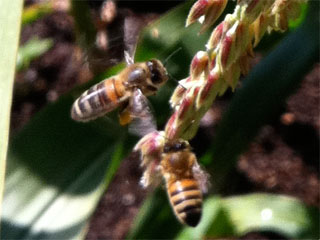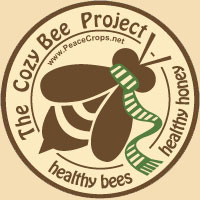Good news! The EU has recently decided to restrict the use of neonicotinoids, a class of pesticide that has been linked to declining bee populations. Whether or not you like honey, you should care about this because bees also pollinate nearly a quarter of all food grown on this planet. We are in huge trouble without them.
Most of us beekeepers have been ranting about this for a while. Agrochemical manufacturing giants like Bayer Crop Science say that they’ve tested it and it doesn’t hurt bees, but the latest thinking is that the tests are flawed… they only look at live, adult bees. Bee larvae aren’t examined, and no one is studying the long term effect after several generations of exposure in a colony. It would be like saying thalidomide is OK as a sleeping pill… despite the fact that it caused tens of thousands of kids to be born without limbs in the 50s and 60s.
In other good bee news, work is being done at Purdue University (thanks for the article, dad!) to isolate a gene in bees that encourages anti-mite behavior. Mites are one of the other big problems in bee survival; these parasites sucky the bodily fluids of larval bees, and in large enough numbers, can destroy the entire colony. Some bees, however, will discard infected larvae or even attack the mites directly. The idea is that by figuring out which bees carry this gene, they can be selectively bred to enhance this trait- it’s like the selective breeding mankind has done with livestock for millennia, but with less trial-and-error. Note that this is different from “genetic modification,” or grafting a gene from one species of creature into another. That’a process I’m generally uncomfortable with, as it can have long-reaching effects that we as humans can’t foresee… and will be unable to control, once a genetically modified organism is out in the wild and reproducing rampantly. The aforementioned neonicotinoid pesticide is a good example: scientists have genetically engineered a type of sunflower that contains a gene from another plant, causing it to manufacture this pesticide in its own cell structures. Great for protecting against bugs eating your harvest, but what happens if this things spreads in the wild, and then we realize it kills bees too?
 I’ve been thinking about bees today, because I just had a paperwork meeting with Terry, my Bee Mentor. I’m in the OSU Master Beekeeper program, and as a part of that, we have a paperwork/ skills checkoff system very similar to earning ranks in Boy Scouts. As a kid, I enjoyed that sort of thing, but as an adult, it feels kindof goofy. Terry feels similarly, but we both realize that it’s merely a necessary inconvenience in the overall system to encourage a structured learning progression for a rather complicated craft. It’s also a good excuse to get together and talk about those fuzzy, buzzy bees- something beekeepers really like to do too.
I’ve been thinking about bees today, because I just had a paperwork meeting with Terry, my Bee Mentor. I’m in the OSU Master Beekeeper program, and as a part of that, we have a paperwork/ skills checkoff system very similar to earning ranks in Boy Scouts. As a kid, I enjoyed that sort of thing, but as an adult, it feels kindof goofy. Terry feels similarly, but we both realize that it’s merely a necessary inconvenience in the overall system to encourage a structured learning progression for a rather complicated craft. It’s also a good excuse to get together and talk about those fuzzy, buzzy bees- something beekeepers really like to do too.

